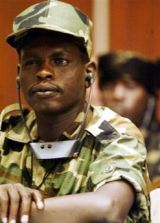Darfur rebel JEM demands to move AU summit from Sudan
Nov 17, 2005 (NAIROBI) — The Justice and Equality Movement (JEM), one of the two main rebel groups in the conflict-torn western Sudanese region of Darfur, has asked the African Union not to go ahead with a plan to hold its January summit in Khartoum, and to ensure that Sudan does not assume the AU presidency in 2006.
 The planned summit, JEM president Khalili Ibrahim Mohammed said, would compromise the AU’s mediation role in Sudanese peace talks.
The planned summit, JEM president Khalili Ibrahim Mohammed said, would compromise the AU’s mediation role in Sudanese peace talks.
“We are totally refusing the suggestion that Bashir would become the new chairman of the AU. The AU troops will lose their impartiality,” Mohamed, told IRIN on Wednesday.
“Bashir can never hold the AU presidency while conducting peace negotiations in Darfur at the same time,” the rebel leader added.
Sudan is scheduled to host the annual AU summit on 23-24 January. Host president, Umar al-Bashir, is one of the candidates for the AU presidency, which will rotate this year to East Africa.
Saying JEM did not want to give up on the AU-mediated talks in the Nigerian capital, Abuja, Mohamed called for the January AU summit to be held elsewhere. He proposed giving Nigerian President Olusegun Obasanjo another term or offering the chairmanship to a country other than Sudan.
Separately, Human Rights Watch (HRW), said in a statement issued on Thursday that holding the meeting in Khartoum would “reward the sponsors of crimes against humanity”.
“The African Union’s efforts in Darfur have been met with constant obstruction by a government that refuses to change its abusive policies,” Peter Takirambudde, Africa director at HRW, said.
“The African Union should not reward the sponsors of crimes against humanity with the honour of hosting the AU summit or ascending to its presidency,” he added.
Adam Chiam, spokesman for Alpha Oumar Konare, the chairman of the AU Commission, however, maintained on Thursday that the AU summit would proceed as planned.
“The decision was taken by the African heads of state and, so far, the meeting is still planned to take place in Khartoum,” he said.
According to HRW, Sudan was slated to host the AU summit in July and take over the presidency at that time. However, the AU changed the venue to Libya due to concerns over continuing human rights abuses and ceasefire violations in Darfur.
Since then, Nigeria has continued to hold the AU presidency. Member countries are, however, expected to elect the next president at the January summit.
Meanwhile, the AU announced that the resumption of the Darfur peace talks, scheduled to start on Monday, had been delayed until 28 November “for logistical reasons”, Associated Press news agency reported on Thursday.
To prepare the ground for the seventh round of peace talks, UN Secretary-General Kofi Annan’s special representative for Sudan, Jan Pronk, left for South Darfur on Wednesday for discussions with commanders of Darfur’s largest rebel group, the Sudan Liberation Movement/Army (SLM/A).
The SLM/A leadership has been under pressure to resolve their internal differences and present a united front at the upcoming talks.
“We support the unity of the SLM/A. This split complicates the peace talks,” JEM president Mohamed said.
“To unite the movement, impartial mediation is needed by countries such as the US, the UK, or Libya,” he noted. He added, however, that it would take a long time to reconcile the differences within the SLM/A.
The Sudan People’s Liberation Movement (SPLM) announced it would hold intensive talks with the JEM rebels within the next few days, in order to come up with a stand that would satisfy all the parties taking part in the forthcoming Abuja talks.
The Darfur conflict erupted in February 2003 when the two main rebel groups, the SLM/A and the JEM, took up arms to fight what they called the discrimination and oppression of the region by the Sudanese government. The government is accused of unleashing militia – known as the Janjawid – on civilians in an attempt to quash the rebellion.
Some 3.3 million people continue to be affected by the conflict, according to the UN, of whom 1.8 million are internally displaced and 200,000 have fled to neighbouring Chad.
The AU sent a military observer force into the region in June 2004 to monitor a ceasefire agreement signed in April between the Sudanese government and the two rebel groups.
Since July 2004, the number of AU observers, troops and other personnel has risen to almost 7,000, and the mandate has broadened to include protection of civilians under “imminent threat and in the immediate vicinity”.
(IRIN)
